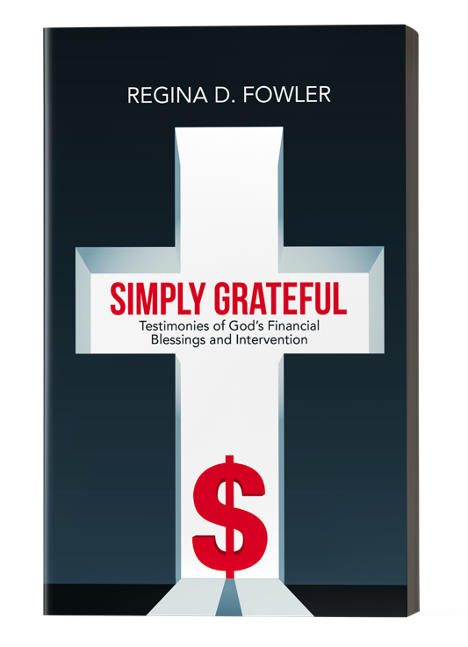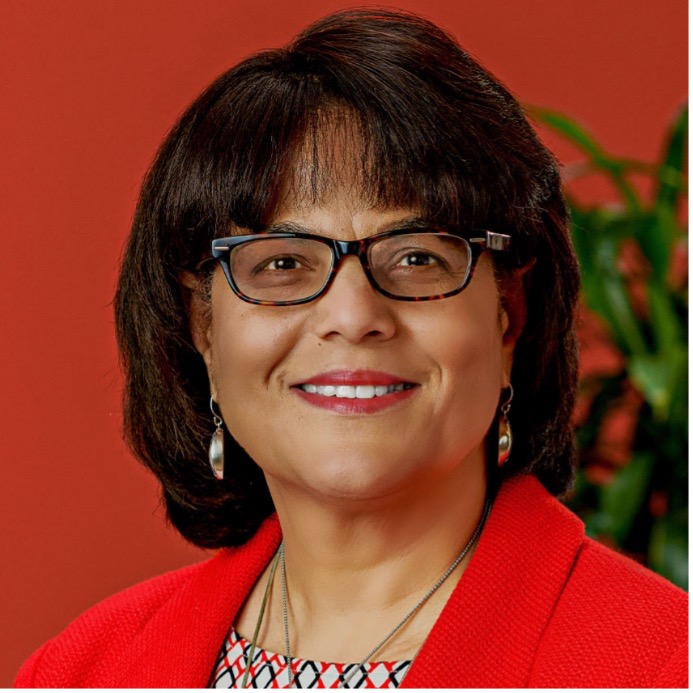The Book
SIMPLY GRATEFUL
Simply Grateful, the book by author Regina D. Fowler, takes the reader through a personal journey that provides evidence that God is faithful to fulfill His promises regarding our finances. When God is the guide and with the application of Biblical yet practical financial principles, the reader learns that God not only blesses us financially but also intervenes on our behalf when financial mishaps are made. Simply Grateful addresses four key Biblical financial principles that lead to financial contentment and life blessings. If the reader has taken classes on financial stewardship before, but still struggles with being a good steward, this book will be proof positive that God’s financial principles work!
Purchase Simply Grateful on Amazon
Purchase Simply Grateful on Barnes and Noble
Purchase Simply Grateful on Westbow Press

About The Author
Regina Fowler was born in St. Louis, Missouri, the tenth child of twelve to her parents, Jesse and Mary Battle Sr. Her parents taught Regina and her siblings to trust God no matter how life appeared on the surface. Their faith influenced Regina as she watched them live their lives completely trusting in God’s promises. Regina committed her life to God at the age of 16 under the leadership of her late father and pastor, Bishop Jesse Battle Sr. At her church, she served in many capacities, including being a Sunday school teacher, the financial secretary for her church, and youth president of her home church and her regional church organization. After her father passed and her church moved from the city limits, Regina and her family moved their membership to another church in the city of St. Louis. It was at that church she was encouraged by her pastor’s wife, Sheila Coleman, to teach regular series on financial stewardship. After being allowed that opportunity, Regina became passionate about encouraging other Christians to have faith in God, be good financial stewards, and to give. Regina passionately believes these principles are Biblical and brings about God anointed financial blessings to those sincere in following these principles.
Regina became a certified Dave Ramsey financial counselor in 2016 to further her skills in financial counseling.
Regina is a Certified Public Accountant and practiced her profession in the corporate world for more than 34 years before retiring from full-time work at the end of 2018. She has led the finance and human resources divisions of several organizations in St. Louis, Missouri. In retirement, she serves as a director on several not-for-profit boards. She also formed her own not-for-profit, C-HOPE Ministry (Christians Helping Others with Professional Expertise), to provide accounting support and financial guidance to small and/or start-up not-for-profits and churches, to conduct classes and seminars on financial acumen and management, as well as provide personal financial counseling to individuals and/or couples. Regina Fowler has counseled many individuals and couples on personal financial management. In addition, she has conducted classes and seminars at not-for-profit organizations and churches on a local, national, and international level.
Regina and her husband, Craig Fowler, a financial professional also, have been married more than 40 years and have two children, Erin Fowler, an attorney, and Andrew Fowler, a journalist.
EXCERPTS FROM SIMPLY GRATEFUL
Simply Grateful, Back Cover
“Ephesians 3:20 – This scripture is not simply saying God is able to bless us in a great way or in abundance; of course, He can and does. It is telling us that God is able to exceed what we as mere humans consider to be abundance. If we think what we have is an abundance, then we have fallen short on our understanding of what God can do. Therefore, after the phrase “exceeding abundantly” comes the phrase “above all that we ask or think.” God does not limit what He can do for us; only we can do that, “according to the power that worketh in us.” In other words, only our level of faith in God limits how far He exceeds our expectations. Be clear: abundance is not just about how much money or material possessions we have; it’s more about the peace we can experience amid our abundance.”
Principle of Budgeting, Simply Grateful, pages 84 and 85
“There is nothing like having a house that is completely paid for, living with no debt, having two adult children who live on their own and pay their own bills, and having more than sufficient earnings to live comfortably. We have been blessed to have considerable investments and savings, several debt-free properties that provide us revenue, and most importantly, we have peace of mind. When we think about Jesus and all He has done for us, our souls must cry out and brag about how great God is. Let me repeat, “The blessing of the Lord, it maketh rich, and he addeth no sorrow with it” (Proverbs 10:22 KJV). Also, I repeat, “Now unto him that is able to do exceeding abundantly above all that we ask or think, according to the power that worketh in us” (Ephesians 3:20 KJV). When blessings are God’s response to our obedience to His principles, they are without sorrow, and they exceed what we thought or imagined for ourselves.”
Principle of Budgeting, Simply Grateful, pages 88 and 89
“Self-management starts with a plan. Budgeting scares people because it requires self-awareness, planning, and accountability. However, if you start the budgeting process with the understanding that becoming self-aware through planning and budgeting, eventually—and from my experience, sooner rather than later—you become financially stable and free. Planning and budgeting do not bind us; these tools free us. I love what the Bible says about planning. When King David understood he would not build a temple for his nation, he planned to ensure his son Solomon had all the materials needed to build it. In Luke 14:28 (KJV), we are challenged to plan. The scripture says, “For which of you, intending to build a tower, does not sit down first, and counts the cost to build to determine if he has enough to finish the build?” In other words, plan first.”
Principle of Faith, Simply Grateful, page 96
“Faith in God requires us to commit our actions to God’s direction—and sometimes one step at a time without a clear picture of how things will turn out. Faith also requires us to trust that God knows what He is doing on our behalf. While this seems to be a big risk, the fact is that people do this regularly with other people and professionals. When we have surgery, we do not understand clearly what the doctor must do. We take him at his word and trust he will perform the surgery without any damage to us. We trust contractors will build our kitchens and baths according to code. When we trust these professionals and they are good at what they do, we expect the outcomes to be to our benefit. With God, the same principle of faith applies. Regarding finances, we can go to God and let Him know that we want financial freedom and we need His expertise and guidance. After acknowledging God and confessing faith in Him, we must let God guide us. I do not suggest this is easy, especially in the beginning of the financial freedom journey. In fact, there may be times you go back to old spending habits. As mentioned before, Craig and I did. However, I encourage you to get back up and start the financial faith journey from where you left off. The more you rely on faith in God, you will see how much God responds to your faith.”
Principle of Giving, Simply Grateful, pages 105 and 106
“When I teach or coach on personal finances, I encourage people to become givers. In many cases, I get questions about how giving away money lines up with managing finances, especially when people are already challenged with their finances. Our instinct may tell us to hold on to everything we have, but God’s principle on giving is you reap what you sow. So, I spend time clarifying what the Bible says about giving and givers. While giving is very much a biblical principle, it is one that believers and nonbelievers can apply to their lives, then reap the rewards. Giving can be an act of compassion and/or an act of faith. God rewards both the compassionate and faithful givers. I believe it is important to explain the principles of giving for those who are compassionate givers and for those who give as an act of faith. If you sow (give) out of compassion and/or out of faith, God will provide you a harvest to reap.”
